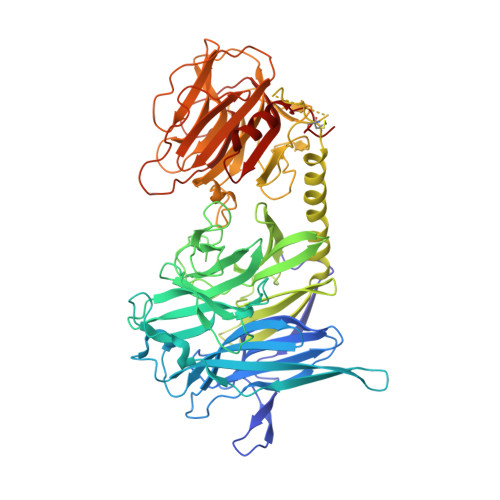A Sialidase Mutant Displaying Trans-Sialidase Activity
Paris, G., Ratier, L., Amaya, M.F., Nguyen, T., Alzari, P.M., Frasch, C.(2005) J Mol Biology 345: 923
- PubMed: 15588836
- DOI: https://doi.org/10.1016/j.jmb.2004.09.031
- Primary Citation of Related Structures:
1WCS - PubMed Abstract:
Trypanosoma cruzi, the agent of Chagas disease, expresses a modified sialidase, the trans-sialidase, which transfers sialic acid from host glycoconjugates to beta-galactose present in parasite mucins. Another American trypanosome, Trypanosoma rangeli, expresses a homologous protein that has sialidase activity but is devoid of transglycosidase activity. Based on the recently determined structures of T.rangeli sialidase (TrSA) and T.cruzi trans-sialidase (TcTS), we have now constructed mutants of TrSA with the aim of studying the relevant residues in transfer activity. Five mutations, Met96-Val, Ala98-Pro, Ser120-Tyr, Gly249-Tyr and Gln284-Pro, were enough to obtain a sialidase mutant (TrSA(5mut)) with trans-sialidase activity; and a sixth mutation increased the activity to about 10% that of wild-type TcTS. The crystal structure of TrSA(5mut) revealed the formation of a trans-sialidase-like binding site for the acceptor galactose, primarily defined by the phenol group of Tyr120 and the indole ring of Trp313, which adopts a new conformation, similar to that in TcTS, induced by the Gln284-Pro mutation. The transition state analogue 2,3-didehydro-2-deoxy-N-acetylneuraminic acid (DANA), which inhibits sialidases but is a poor inhibitor of trans-sialidase, was used to probe the active site conformation of mutant enzymes. The results show that the presence of a sugar acceptor binding-site, the fine-tuning of protein-substrate interactions and the flexibility of crucial active site residues are all important to achieve transglycosidase activity from the TrSA sialidase scaffold.
- Instituto de Investigaciones Biotecnológicas-Instituto Tecnológico de Chascomús, CONICET-UNSAM, CC30, 1650, San Martín, Buenos Aires, Argentina. gparis@iib.unsam.edu.ar
Organizational Affiliation:
















